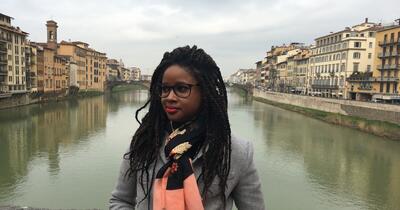
Meet Candace Bond-Theriault, Associate Director of Movement Building
Bond-Theriault works through a Black, queer feminist lens to drive change and build power.

Movement builder, policy expert, professor, and lawyer Candace Bond-Theriault works through a Black, queer feminist lens. She leverages deep experience across multiple facets of the progressive space, from academia, policy development, and advocacy, to drive intersectional change and build power. She joined Dēmos from Columbia University Law School’s Center for Gender and Sexuality and previously advanced critical federal legislation and built partnerships across organizations while at Planned Parenthood, the National LGBTQ Task Force, and the ACLU. She’s also an accomplished writer with bylines in Self Magazine, The Nation, The Root, and Ms. Magazine. Her first book, Queering Reproductive Justice: An Invitation, will be published by Stanford University Press in the summer of 2024.
Whether advancing the Each Act, to reverse the Hyde Amendment, writing amicus briefs for cases to expand LGBTQIA+ rights, or teaching the next generation of movement leaders, Bond-Theriault's throughline, her guiding light— is intersectionality.
She was introduced to Kimberlé Crenshaw’s writing on intersectionality while a student at the College of William and Mary. “We're really all on the same side.... whether it’s economic justice, democracy reform, or any other progressive cause, all of us are fighting for the same things...for bodily autonomy, dignity, justice, and self-determination,” says Bond-Theriault. "Movement work, regardless of what movement that you're in, is really about that.”
The sooner we realize that, the sooner we shift power. Bond-Theriault believes that democracy reform is critical to that shift. It's also why she was drawn to Dēmos.
“Democracy is the core issue area,” she says. “Because without democracy, you can't really do anything else... most of my career has been in reproductive health and justice, LGBTQ liberation, and even in those fields, which are amazing, democracy keeps coming up as a needed intervention for all communities.”
“Democracy is the core issue area...Because without democracy, you can't really do anything else"
And she wants Black and brown communities to use that intervention and get comfortable claiming self-determination and power. “I have been told that power isn't for me,” she says, reflecting on her experience as a Black woman. To define power and then to build it, “we have to unlearn the 400 plus years of Americanness that has told us who, in fact, has power and who doesn’t. And just recognizing that hits up against institutions that have declared who is worthy of power."
She says doing this work is also personal. “I'm a mom, and that's a huge reason why I do the work that I do because I want my son to live in a healthy democracy,” she says.
“I do not want my son to come of age in a world that doesn't see, hear, or understand him. And to me, that starts with democracy.”
“I do not want my son to come of age in a world that doesn't see, hear, or understand him. And to me, that starts with democracy.”




